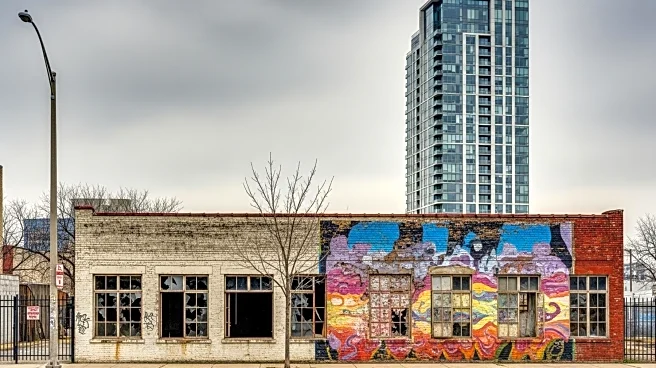What is the story about?
What's Happening?
In Pilsen, a neighborhood in Chicago, young adults are increasingly choosing to live with their parents due to rising housing costs and gentrification. Bibiana Saucedo, a 23-year-old artist, exemplifies this trend as she resides with her family to afford living in her childhood neighborhood. The area has seen a significant increase in property taxes and rent, driven by new, higher-income residents and developments. This has led to the displacement of many Latino families who have historically lived in Pilsen. According to Winifred Curran, a professor at DePaul University, the housing supply is not meeting demand, and wages are not keeping pace with the cost of living. Multigenerational living is common among Latino families, providing financial and emotional support, but the influx of wealthier newcomers is altering the neighborhood's demographic and cultural landscape.
Why It's Important?
The situation in Pilsen highlights broader issues of affordability and cultural displacement in urban areas across the U.S. As gentrification progresses, long-standing communities face the risk of losing their homes and cultural identity. The rising cost of living without corresponding wage increases exacerbates economic inequality, particularly affecting minority groups. This trend could lead to increased socioeconomic stratification and loss of cultural heritage in historically diverse neighborhoods. The challenges faced by Pilsen's residents reflect a national trend where young adults are forced to live with family due to economic pressures, impacting their independence and future financial stability.
What's Next?
As gentrification continues, community leaders and residents may push for policies to preserve affordable housing and protect cultural heritage. Efforts could include advocating for rent control measures, community land trusts, or zoning changes to support diverse housing options. The response from policymakers and developers will be crucial in determining the future of neighborhoods like Pilsen. Additionally, there may be increased activism and community organizing to resist displacement and maintain the cultural fabric of the area.
Beyond the Headlines
The gentrification of Pilsen raises ethical questions about urban development and the responsibility of city planners and developers to consider the social impact of their projects. The loss of cultural landmarks and community spaces can lead to a sense of alienation among long-time residents. Furthermore, the trend of young adults living with parents due to economic constraints may have long-term implications for family dynamics and individual life choices, potentially delaying milestones such as homeownership and starting a family.















